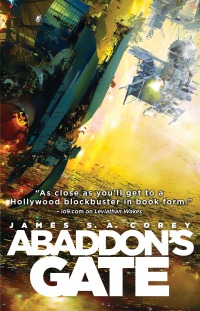Abaddon's Gate by James S.A. Corey
 Friday, June 7, 2013 at 1:01PM
Friday, June 7, 2013 at 1:01PM 
Published by Orbit on June 4, 2013
The protomolecule, once confined to Venus, has managed to launch a self-assembling Ring that sits outside the orbit of Uranus. Anything that tries to fly through the middle of the Ring comes to an immediate stop before it begins a slow motion trip in a different direction, leading to the conclusion that the Ring is some sort of gate. Representatives of Earth, Mars, and the Outer Planets all converge on the Ring, as do Jim Holden and his crew. Although Holden would prefer not to investigate the protomolecule's latest actions, he's given no choice. Of course, from the moment the Ring is introduced, the reader knows that Holden will fly through it.
As you would expect, Holden and his crew (Naomi, Alex, and Amos) return in this third novel of The Expanse. As you might not expect, so does Josephus Miller, who is back from the dead. Or maybe it's not Miller, but something Miller-like is a key character again. Also returning is Julie Mao's sister Clarissa, now known as Melba Koh. She blames Holden for Julie's death (or transformation) and she's devised a cunning plan to obtain revenge. None of this will make the slightest bit of sense unless you've read Leviathan Wakes and Caliban's War, which I would urge any fun-seeking fan of science fiction to do. You could probably understand and enjoy Abaddon's Gate without reading the first two novels, but you'd be missing sooooo much context that it would be a mistake.
Other significant characters (some new, some returning from earlier books) include: Anna Volovodov, a member of the clergy who joins a UN advisory group on a mission to the Ring; Carlos Baca, a/k/a Bull, the untrusted security chief from Earth on a converted generation ship named Behemoth that belongs to the Outer Planets; Sam Rosenberg, Behemoth's chief engineer; Clarissa's wealthy aunt, Tilly Fagan; and Monica Stuart, a journalist who accompanies Holden and his crew, documenting their response to the Ring.
As they proved in the first two books, the writing team known as James S.A. Corey knows how to tell a fast-moving story that mixes humor with drama. This time, Holden is up against a space station that makes the Death Star look like a slingshot, as well as the usual array of humans who would like to jettison him out an airlock. While the action is never shortchanged (there's enough to satisfy the most ardent space opera fan), the novels are so good because the writers bring the story back to the people who are affected by it. The writers have a keen understanding of human nature and a remarkable ability to translate that understanding into emotionally complex, fully formed characters. Holden, in particular, changes a bit in every novel. This time, having lost his self-righteousness, he struggles against "creeping nihilism" and tries to recapture a sense of purpose.
Heroism and self-sacrifice have been consistent themes in The Expanse, and that remains true in Abaddon's Gate. Unlikely heroes have always emerged in these novels, and one of the new characters might be the unlikeliest of them all. As one of the minor characters notes, heroism is what happens when people don't think about the consequences of their actions. As another character demonstrates, the same is true of people who commit evil acts. Circumstances often dictate heroism, just as they dictate villainy, a subtle point that Abaddon's Gate illustrates brilliantly.
The writing is strikingly visual. Reading the Corey novels is like watching an extraordinarily detailed movie. Like the other novels in The Expanse, Abaddon's Gate delivers what fans want from space opera -- furious interstellar action, a sense of wonder and awe -- but it does more than that. The addition of a clergy member to the story invites discussions of philosophy -- not dry sermons or religious musings, but meaningful thought about forgiveness and the possibility of redemption and the benefit of using persuasion, rather than violence, to achieve just ends (themes that are present in each novel, but sharpened in focus in Abaddon's Gate). The novel is funny and exciting and moving and, on occasion, it comes close enough to being profound to set it apart from the vast majority of space opera.
RECOMMENDED
Reader Comments